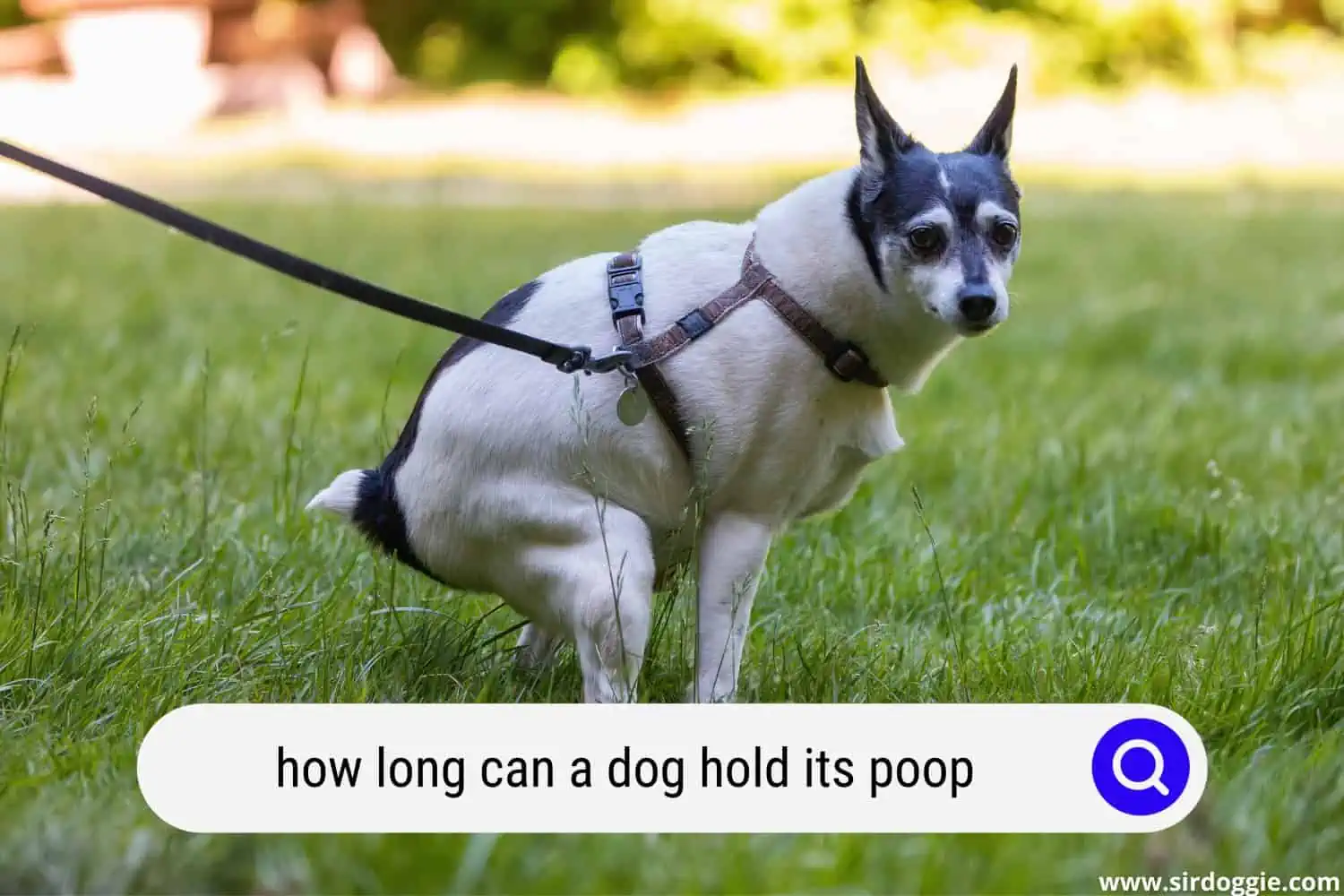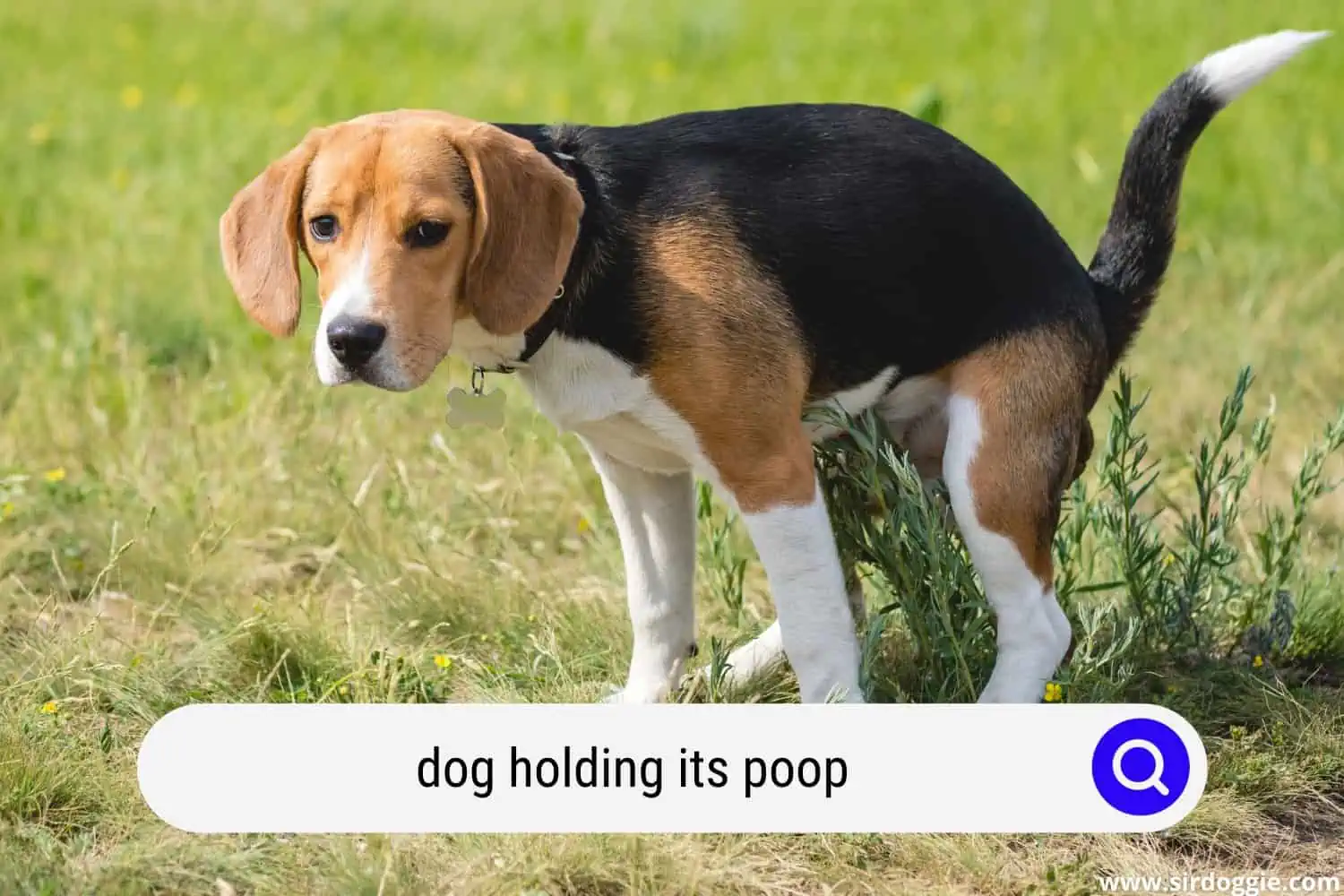How Long Can a Dog Hold Its Poop?
Dog poop is one of the most unpleasant issues dog owners have to deal with daily. No one likes to walk through it or smell it, nor does anyone like having to clean up after their dog after they’ve pooped. It’s also not pleasant for our dogs when they have to relieve themselves but are unable to do so when and where they need to.
A regular pooping pattern—such as going after meals or going poop first thing in the morning—can be taught to dogs. However, several changes may occur in their lives that may impact the frequency of their pooping.
So, as most pet parents want to know, what is the exact time limit for which a dog can hold its poop?

Healthy adult dogs may hold their poop for 8 to 10 hours if they have to, yet puppies, on average, can hold their poop for only one to two hours if they are just one or two months old. If a puppy is three to four months old, it should be able to hold its poop for around four hours. However, poop-holding capacity as well as duration may vary based on a dog’s training and dog breed.
Note: Newborn or puppies that are only a few days old do not have any ability to hold their poop.
Keep in mind that your dog’s diet and any specific health issues can impact how frequently they need to go during the day, so it’s essential to consult your veterinarian for advice on preventing accidents and discussing possible treatment options, incontinence, or constipation issues that arise.
Factors Affecting the Rate of Dog Poop
The duration of time that a dog can hold its feces is determined by several factors, including:
- Age
- Size
- Health
- Diet
Age
The most well-known factor in determining how long your dog can go between toilet breaks is his or her age. The ability of younger dogs—particularly pups who aren’t entirely toilet trained—to hold their poop for longer durations is limited and much lower than older, trained dogs. This is also partly because their bladders and urinary tract systems are smaller and still underdeveloped, too.
It is more than just a matter of holding capacity, though. It takes time for the muscle that contracts to hold or release the bladder to be fully developed. To avoid accidents, some puppies require more frequent toilet breaks than others. Potty training includes assisting them in the development of these muscles as well as learning how to manage their bladder.
Senior dogs may also begin to lose their ability to regulate their muscles as they get older. Muscle deterioration, inflammation, mobility limitations, and impaired kidney and liver function can contribute to increased toilet visits. Whether young or old, the issues that affect a dog’s ability to manage their urination needs also apply to their digestive tract as well.
Size
The size of your dog is also a significant consideration. When compared to a bigger dog, the organs of a little or toy breed dog are extremely small. This does not necessarily imply that all large dogs can retain their poop for extended periods, but it may be a factor in their higher rates of success with potty and house training.
Every dog is an individual, and the potty habits of different dogs can be incredibly diverse. Making a potty plan tailored to your dog’s specific needs is essential.
Health
A variety of medical disorders can lead to an increased frequency of pooping in canines. Urinary tract troubles, renal problems, diabetes, and even obesity can play a role in this condition.
Medications also have a part in the process. Some drugs may have a cathartic or laxative effect, meaning that they will stimulate your dog to defecate more frequently.
If you are concerned that your canine companion is pooping more frequently than usual, you need to consult with your veterinarian on these issues. It may be a sign of a severe medical condition that requires prompt medical attention.
Diet
The type of food you give your dog significantly impacts your canine’s gastrointestinal tract. Moisture-dense meals, such as raw and wet foods, may cause an increase in both the volume and frequency of your dog’s pooping.
Although your dog may need to go to the bathroom more frequently, moisture-rich foods significantly aid in digestion and can help flush out toxins and germs that have accumulated in their systems. Dogs who consume a primarily dry diet—like kibble—may poop less, but this does not necessarily imply that they are healthier in any way.
The Importance of Having a Bathroom Routine
Adult dogs can hold their poop for an extended period. They can hold their poop for up to 8-10 hours on average if they have to (as discussed above).
However, when you force your dog to retain its poop for an extended period on a frequent basis, you raise the chances of:
- Digestive tract infections: Part of the digestive cycle assists the body in flushing away germs and toxins that have accumulated in the gut. Holding their poop for extended periods allows those germs in the GI tract to further populate. This can result in obstructions that can quickly become life-threatening.
- Cancer: Carcinogens in feces will have more opportunities to interact with cells the longer they remain in touch with the gut, and this increases the risk of your dog developing gut cancer. This is a less prevalent problem, but it should still be considered when determining how long your pet should be forced to wait for another poop break.
- Incontinence: Although it is more prevalent in older pets, incontinence can occur in dogs of any age. When dogs are forced to hold their poop for an excessive amount of time, it causes pressure on the ureters, leading to blockage of urine.
If your furry friend is having any problems with his or her bathroom needs, you should consult with your veterinarian as soon as possible. Not pooping, straining to poop, pooping too frequently, having diarrhea, and having blood in its feces are all indicators of a far more serious problem that will need immediate attention.

FAQs
When do dogs start holding their poop?
Even pups as young as 4 weeks old may be able to hold in their poop for an hour or so, but accidents may and will happen! As pups mature, they grow more adept at recognizing when it’s appropriate to refrain from relieving themselves and wait to be taken out.
As puppies get older and enter adolescence (5 to 6 months of age), they are usually able to hold in their feces for up to about 6 hours, which makes it much simpler to keep them potty-trained and avoid accidents while you’re at work or have them with you on a lengthy car drive without stopping. This is also an indicator that your dog is still young and in good condition.
Sick and elderly dogs will not be able to hold their feces or urine for as long as they would otherwise be capable if in good health or younger. In sick dogs, muscle contraction capabilities may be lost due to the severity of their disease, and these dogs therefore may poop more often. Similarly, senior dogs also show these same issues: they lose control of their pooping behavior, despite any potty or house training, due to their advanced age.
Is it possible for a dog to hold their poop overnight?
Healthy canines should be able to sleep through the night without having to go potty but keep in mind that your pooch’s ability to resist nature’s call until morning will depend on how well-trained he is, what you are feeding him, and whether or not he is on any medications.
Even though your dog may have reached an age of self-control, it is still possible for the following factors to contribute to its urge to poop in the middle of the night. Discuss any of these with your veterinarian, if concerns arise.
- Disease and illness: If your dog is suffering from a parasitic or viral infection, this may result in him or her having frequent bowel movements even during the night. They may also be suffering from inflammatory bowel disease (IBD) as a result of eating specific foods, being under stress, or a variety of other possible causes.
- Aging: If your dog has canine Alzheimer’s disease, he or she may defecate all night long. Unfortunately, this cognitive impairment may cause your dog to forget his previous house training, resulting in him or her pooping at inconvenient times and in unsuitable locations.
- Overfeeding: It is also possible that you have simply fed your dog too late in the evening, causing them to have to process that extra food overnight. Remember to consider any new snack items or snacks you may have added to their diet that might be contributing to the shift in their bowel movements.
Is it harmful for dogs to hold their poop?
Yes. It can be harmful if your dog is holding in their feces for an extended period (such as more than 24 hours), and this can eventually result in stomach pain and major health problems such as an impacted colon.
The development of an impacted colon in canines is known as the ‘mother of all diseases’ in dogs because it easily leads to other gastrointestinal issues and toxicity throughout their bodies.
When this condition occurs, your dog’s fecal matter gets very hard and dry to the point where it becomes unable to pass through the dog’s digestive tract. As a result, your dog will require laxatives and—in some cases—surgery to fix the problem. Feeding your dog high-fiber foods can help prevent this impaction from occurring.

Family Dog Expert Author
Hi there! I’m Stuart, a devoted dog lover and family dog expert with over a decade of experience working with our furry companions. My passion for dogs drives me to share my knowledge and expertise, helping families build strong, loving bonds with their four-legged friends. When I’m not writing for SirDoggie, you’ll find me hiking, playing with my beautiful dog, or studying music.